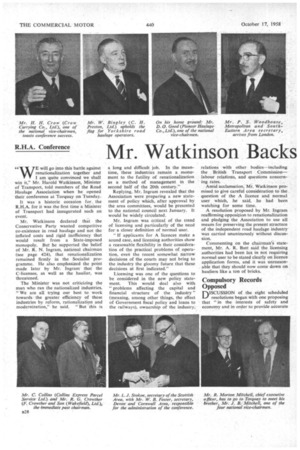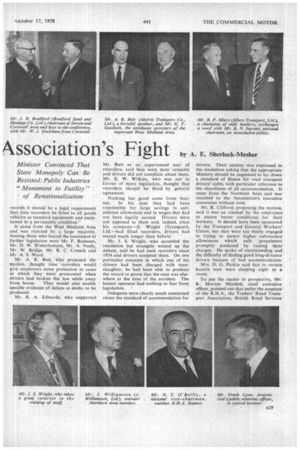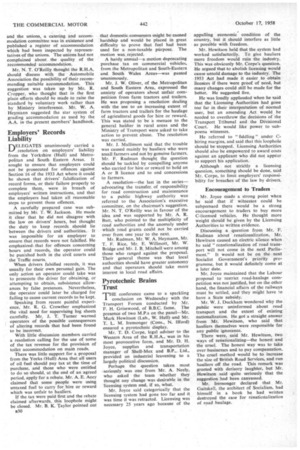Mr. Watkinson Backs
Page 62

Page 63

Page 64

If you've noticed an error in this article please click here to report it so we can fix it.
Association's Fight by A. E. Sherlock-Mesher
Minister Convinced That State Monopoly Can Be Resisted: Public Industries "Monument to Futility" of Renationalization
W
4 4 E will go into this battle against
renationalization together and I am -quite convinced we shall win it," Mr. Harold Watkinson, Minister of Transport, told members of the Road. Haulage Association when he opened their conference at Torquay on Tuesday. It was a historic occasion for, the R.H.A. for it was the first time a Minister of Transport had inaugurated such an event.
Mr. Watkinson declared that the Conservative Party wanted competitive co-existence in road haulage and not the inflated costs and rigid inefficiency that would result from a State-imposed monopoly. But he supported the belief of Mr. R. N. Ingram, national chairman (see page 424), that renationalization remained firmly in the Socialist programme. He also emphasized the point made later by Mr. Ingram that the C-licensee, as well as the haulier, was
threatened. .
The Minister was not criticizing the man who ran the nationalized industries. "We are all trying our best to work towards : the greater efficiency of these industries by reform, rationalization and modernization," he said. "But this is a long and difficult job. In the meantime, these industries remain a monument to the futility of renationalization as a method of management in the second half of the 20th century."
Replying, Mr. Ingrain revealed that the Association were preparing a new statement of policy which, after approval by the area committees, would be presented to the national council next January. It would be widely circulated.
Mr. Ingram was critical of the trend of licensing and particularly of the need for a closer definition of normal user.
"If applicants for A licences make a sound case, and licensing authorities show a reasonable flexibility in their consideration of the practical problems of operation, even the recent somewhat narrow decisions of the courts may not bring to the industry the gloomy future that these decisions at first indicated."
Licensing was one of the questions to be considered in the new policy statement. This would deal also with "problems affecting the capita! and financial structure of the industry" (meaning, among other things, the effect of Government fiscal policy and loans to the railways), ownership of the industry, relations with other bodies—including. the British Transport Commission— labour relations, and questions concerning rates.
. Amid acclamation, Mr. Watkinson promised to give careful consideration to the question of the A licence and normal user which, he said, he had been watching for some time.
A resolution proposed by Mr. Ingram reaffirming opposition to renationalization and pledging the Association to use all means for preserving the present structure of the independent road haulage industry was carried unanimously without discussion.
Commenting on the chairman's statement, Mr. A. R. Butt said the licensing authorities had been lax in not requiring normal user to be stated clearly on licence application forms, and it was unreasonable that they should now come down on hauliers like a ton of bricks.
Compulsory Records Opposed
DISCUSSION of the eight scheduled resolutions began with one proposing that "in the interests of safety and economy and in order to provide accurate records it should be a legal requirement that time recorders be fitted to all goods vehicles as standard equipment and maintained in a serviceable .condition."
It came from the West Midland Area and was rejected by a large majority. Among those who feared the enactment of further legislation were Mr. F. Rudman, Mr. D. W..Winterbottom, Mr. A. Neely, Mr. W. Bridge, Mr. R. C. Crouch and Mr. A. S.. Ward.
Mr. A. R. Butt, who proposed the motion, thought time recorders would give employers some protection in cases in which they were prosecuted when drivers had broken the law while away from home. They would also enable specific evidence of delays at docks to be produced.
Mr. R. A. Edwards, who supported Mr. Butt as an experienced user of recorders, said they were most valuable and drivers did not complain about them. Mr. E. W. Wilkins, who was not in favour of More legislation, thought that recorders should be fitted by general agreement.
Nothing but good came from their use. In his case they had been responsible for large savings in subsistence allowances and in wages that had not been legally earned. Drivers were not opposed to them and, indeed, since his company—E. Wright (Transport), Ltd.—had tilted recorders, drivers had stayed much longer than before.
Mr. J. S. Wright, • who seconded he resolution but strangely wound up the debate, said he had used recorders since 1934 and drivers accepted them. On one particular occasion in which one of his drivers had been charged with manslaughter, he had been able to produce the record to prove that the man was elsewhere at the time of the accident. The honest operator had nothing to fear from legislation. '
Delegates were clearly much concerned about the standard of accommodation for drivers. Their anxiety was expressed in the resolution asking that the appropriate Ministry should be requested to lay down a standard of fitness for road transport drivers' cafes, with particular reference to the cleanliness of all accommodation. It came from the Northern Area and was remitted to the Association's executive committee without vote.
Mr. R. Clifford, proposing the motion, said it was an attempt by the employers to secure better conditions for their workers, it should have been sponsored by the Transport and General Worker.? Union, but they were too busily engaged in trying to secure higher subsistence allowances which café proprietors promptly pocketed by raising their charges. He spoke of overcrowding and the difficulty of finding good long-distance drivers because of bad accommodation.
Mrs. D. G. Parkin said that in certain hostels men were sleeping eight in a Mom.
To put the matter in perspective, Mr. R. Morton Mitchell, chief exicutive officer, pointed out that under the auspices of the R.H.A., the Traders' Road Transport Association, British Road Services
and the unions, a catering and accommodation committee was in existence and published a register of accommodation which had been inspected by representatives .of the unions. The unions had not complained about the quality of the recommended accommodation.
Mr. N. T. O'Reilly thought the R.H.A. should discuss with the Automobile Association the possibility of their recommending suitable accommodation. This suggestion was taken up by Mr. R. Cropper, who thought that in the first place 'efforts should be made to raise the standard by voluntary work rather than by Ministry interference. Mr. W. A. Heymann suggested the star system of grading accommodation as used by the A.A. in the present members' handbook.
Employers' Records Liability
DELEGATES unanimously carried a resolution on employers' liability from the Yorkshire (Hull) and Metropolitan and South Eastern Areas. It sought to ensure that employers could not be prosecuted for offences against Section 16 of the 1933 Act where it could be shown that drivers' falsification of record forms, or their failure properly to complete them, were in breach of employers' written instructions, and that the employers had taken all reasonable steps to prevent these offences.
A carefully prepared case was submitted by Mr. T. W. Jackson. He made it clear that he did not disagree with the law on drivers' hours, but thought the duty to keep records should lie between the drivers and authorities. It was impossible for an employer to ensure that records were not falsified. He emphasized. that for offences concerning hours and records, the operator could be punished both in the civil courts and the Traffic courts.
When drivers falsified records, it was usually for their own personal gain. The only action an operator could take was to prosecute the driver for obtaining, or attempting to obtain, subsistence allowances by false .pretences. Nevertheless, the operator could later be charged for failing to cause current records to be kept.
Speaking from recent painful experience: Mr. R. G. Crowther emphasized the vital need for supervising log sheets carefully. Mr. J. T. Turner warned operators of the possible consequences of altering records that had been found to be incorrect.
With little discussion members carried a resolution calling for the use of some of the tax revenue for the provision of toilet accommodation on main roads.
There was little support for a proposal from the Yorks (Hull) Area that all users of oil fuel should pay tax at the time of purchase, atid those who were entitled to do so should, at the end of an agreed period, apply for a rebate. Mr. A. E. Acey claimed that some people were using untaxed fuel to carry for hire or reward which was unfair to hauliers.
If the tax were paid 'first and the rebate claimed afterwards, this loophole might be closed. Mr. B. K. Taylor pointed out B30 that domestic consumers might be caused hardship and would be placed in great difficulty to prove that fuel had been used for a non-taxable purpose. The motion was rejected.
A hardy annual—a motion deprecating purchase tax on commercial vehicles, from the Metropolitan and South-Eastern and South Wales Areas—was passed unanimously.
Mr. J. W. Oliver, of the Metropolitan and South Eastern Area, expressed the anxiety of operators about unfair competition from farm tractors and trailers. He was proposing a resolution dealing with the use to an increasing extent of farm tractors and trailers for the haulage of agricultural goods for hire or reward. This was stated to be a menace to the general haillier in rural areas and the Ministry of Transport were asked to take action to prevent abuse. The resolution was carried.
Mr. J. Mallinson said that the trouble was caused mainly by hauliers who were small farmers and not by genuine farmers. Mr. F. Rudman thought the question should be tackled by compelling anyone who carried for hire or reward to hold an A or B licence and to end concessions to farmers.
A resolution—the last in the series— advocating the transfer, of responsibility for road construction and maintenance to a public highway authority was referred to the Association's executive committee, on the chairman's suggestion. Mr. N. T. O'Reilly was in favour of the idea and was supported by Mr. A. R. Butt, who pointed to the multiplicity of road authorities and the anomaly under which road grants could not be carried over from one year to the next.
Mr. Rudman, Mr. W. A. Heymann, Mr. T. F. Rice, Mr. E. Willmott, Mr. W. Bridge and Mr. J. B. Mitchell were among those who ranged against the proposal. Their general theme was that local authorities should have greater autonomy and that operators should take more interest in local road affairs.
Pyrotechnic Brains Trust
THE conference came to a sparkling conclusion on Wednesday with the Transport Forum conducted by Mr. F. H. Grisewood, of B.B.C. fame. The presence of two M.P.s on the panel—Mr. Mark Hewitson (Lab., W. Hull) and Mr. T. L. M. Iremonger (Cons., N. Ilford) ensured a pyrotechnic display.
Mr. T. D. Corpe, legal adviser to the Western Area of the R.H.A., was in his most provocative form, and Mr. D. H. Joyce, supplies and transportation manager of Shell-Mex and B.F.,. Ltd., provided an industrial leavening to a largely political discussion.
Perhaps the question taken most seriously was one from Mr. A. Neely, who asked the team whether they thought any change was desirable in the licensing system and, if so, what.
Mr. Joyce said categorically that the licensing system had gone too far and it was time it was retracted. Licensing was necessary 25 years ago because of the appalling economic condition of the country, but it should interfere as little as possible with freedom.
Mr. Hewitson held that the system had worked satisfactorily. To give hauliers more freedom would ruin the industry. This was obviously Mr. Corpe's question. He argued that to abolish licensing would cause untold damage to the industry. The 1953 Act had made it easier to obtain licences if there were proof of need, but many changes could still 'be made for the better. He suggested five.
He was loudly applauded when he said that the Licensing Authorities had gone too' far in their interpretation of normal user, but an amending Act would be needed to overthrow the decisions of the Transport Tribunal and the Divisional Court. He would like power to subpoena witnesses.
He referred to " fiddling " under Chiring margins, and said that this loophole should be stopped. Licensing Authorities should also be empowered to award costs against an applicant who did not appear to support his application.
Although not strictly a licensing question, something should be done,. said Mr. Corpe, to limit employers' responsibility for breaches of the law by drivers.
Encouragement to Traders
Mr. Joyce made a strong point when be said that if witnesses could be subprenaed there would be a strong encouragement to traders to buy more C-licensed vehicles. He thought more weight should be given by the Licensing Authorities to written evidence.
Discussing a question from Mr. F. Rudman about renationalization, Mr. Hewitson caused an electric silence when he said 'renationalization of road transport will not come in the next Parliament" It would not be on the next Socialist Government's priority programme, but it would definitely come at a later date.
Mr. Joyce maintained that the Labour proposal to restrict road-haulage competition was not justified, but on the other hand, the financial affairs of the railways must be settled, and they might have to have a State subsidy.
Mr. W. J. Duckham wondered why the public were uninformed about road transport and the extent of existing nationalization. He got a straight answer from Mr. Hewitson, who said that hauliers themselves were responsible for any public ignorance.
There were, said Mr. Hewitson, two ways of renationalizing—the honest and the 'cruel The honest way was to take over businesses and to pay compensation. The cruel method would be to increase the size of British Road Services, and run hauliers off the road. This remark was greeted with derisory laughter, but Mr. Hewitson said quite seriously that the suggestion had been canyassed.
Mr. Iremonger declared that Mr. Gaitskell, the architect of Socialism, had himself in a book he had written destroyed the case for renationalization of road haulage.




















































































































